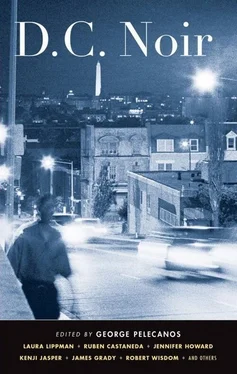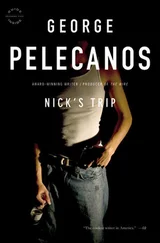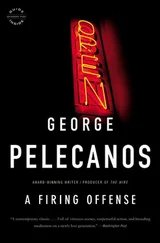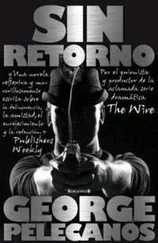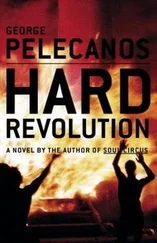“Detectives Phelps and Kearney. Good morning, sirs.”
“How’s business, Waverly?” José Phelps asked.
Ngame gave the sunglasses a last critical look, then turned to face José and Frank. He smiled a mouthful of perfectly straight glistening teeth.
“This is America!” Ngame exploded with exuberance. A-mare-uh-CUH! “Business is always splendid!” A wave of his large hand took in the sidewalk. “One is free to sell and free to buy… buy and sell.” He caressed a handbag. “This purse, for example—”
José pulled Ngame’s string. “Mr. Gucci gets his cut?”
Ngame got the tired look of a long-suffering teacher with a slow student. “Detective Phelps! Do you suppose this is a real Gucci purse?” He swept a hand over the watches. “Or that these are real Rolexes?”
José’s eyes widened. “They aren’t?”
“And do you suppose that any of these good people who come to my stand believe they are buying real Guccis or real
Rolexes?”
José opened his eyes wider.
Ngame spun up more. “And do you suppose that my customers could buy a real Rolex?”
“Oh?” José said, egging him on.
“So who is hurt?” Ngame was deep into it now, eyes wide in enthusiasm, hands held out shoulder-high, palms up. “Not Mister Gucci! Nor Mister Rolex! As a matter of fact, Mister Gucci and Mister Rolex ought to be pleased with me! Yes, pleased! My customers have learnt good taste here at my stand.” Ngame’s chin tilted up. “When they get wealthy, they’ll buy the real Gucci and the real Rolex.”
“Like Skeeter Hodges,” Frank Kearney said.
Ngame gave Frank a heavy-lidded somber look. “He didn’t buy here. He kept the real Mister Rolex in business.”
“What’s the talk?” José asked.
Ngame scanned the sidewalk. He did it casually, but he did it.
“Conjecture?” Con-jec-TURE?
Another glance, this time across the street. “The Puerto Ricans say it was the Jamaicans. The Jamaicans tell me it was the Puerto Ricans. And the American blacks” — Ngame shrugged — “they all point their fingers at one another.”
“No names?” Frank asked.
Ngame shook his head. “No pretender to the throne. But then again, Detective Kearney, it was only last night.”
Ngame paused a beat, then came up with a watch in his hand, gold-gleaming in the morning sun.
“A Rolex President? I will give a discount.”
Solomon watched the two cops get in their car and leave. In the street the crow continued working on the dead rat.
“You watch yourself today, Waverly,” he whispered, and swung his gaze along the alley, past Ngame’s van, toward 31st Street.
Motherfucker’s runnin’ late. Voice came up inside Solomon’s head, peevish, accusing.
“He be along,” Solomon told Voice, “he be along.”
When?
As though on cue, tires squealed. A white Navigator roared in off 31st. Sprays of gravel ricocheted off dumpsters. Partway down the alley the Navigator turned right and disappeared into the Hamilton Court garage.
“See?” Solomon whispered to Voice.
Moments later, Asad the Somali appeared, coming up the ramp carrying a large brief case. A tall, thin man, he had a snaky, boneless way of moving. His tight-fitting yellow suit had a long jacket with five buttons and his skin was a light cocoa and his black hair lay slicked in thinning waves against his skull.
As usual, Asad’s two goons flanked him. Gehdi and Nadif. Solomon had decided they were brothers. Maybe twins, whose orangutan mother had fallen out of an ugly ree.
Two weeks ago, Asad had come to Georgetown and leased a dingy storefront, paying cash. Solomon knew that storefront. A single window displayed garish men’s clothes. The display had never changed. For years, players came and went. But he’d never seen any of them wearing those clothes. That shit only fools or Somalis would wear. Place never had sold anything legal. The Somali wasn’t going to start now.
Asad didn’t waste time setting up his network. He and his goons started with the street vendors. The vendors signed on to buy watches, sunglasses, and handbags from Asad. Asad gave his new partners discounts on the junk. C-phones came with the deal. In return, Asad got a cut on the profits and he would know what was going on the streets. All the vendors had bought in except the Nigerian.
That first day, one of Solomon’s carts had been sticking partway out into the alley. Gehdi misjudged his clearance and scraped the Navigator’s fender.
Asad had stood there and watched with his hard black marble eyes while Gehdi and Nadif punched Solomon to the ground then kicked the shit out of him. They threw his carts out into the middle of Wisconsin Avenue. Things he’d collected, his precious things. The Nigerian had saved some, but the rest, his clippings, his notebooks, they’d been swept away with the street trash.
He’d been beaten before. But never in his alley. That they had done those things to him there shamed him. The alley had provided for him, and when danger came, he had been unable to defend the alley in return.
He gonna make the call?
“Sure he is.” Voice didn’t know its ass from apple butter sometimes.
Looking past Solomon and toward Ngame’s stand, Asad reached into the briefcase and pulled out a fat c-phone/walkie-talkie. Flipping it open, he held it in front of his face.
Solomon saw Asad’s lips move. A second or two passed and Solomon heard one crackling reply, then another.
“One more,” he said to Voice.
Asad waited, holding the c-phone out from his face. Gehdi and Nadif swiveled their heads back and forth, searching the alley.
They expectin’ Santy Claus?
A third crackle. Asad replied and stowed the c-phone away in the briefcase. He said something to the two goons and the three began walking toward Solomon.
They gonna hit you? Hurt you today?
Solomon got a tightness in his chest. How it had been came back to him like it had every day since.
Curled up on the alley bricks. Crying and slobbering and puking. Waiting for the goons to swing another steel-capped toe.
They had grunted with the effort and they had cursed Solomon because beating a man while he was down was hard work and it made them sweat and they blamed him for that.
He lowered his head and pretended to doze. Through slitted eyelids, he saw the shoes approach, then pass.
“Not today,” he whispered to Voice. “Not today.”
As soon as he thought it safe, he lifted his eyes and followed the three Somalis approaching Ngame’s stand.
And along Wisconsin, the other vendors watched.
Ngame saw them cross Wisconsin. He turned and busied himself tightening a C-clamp. He started counting silently. At nine, he heard the sliding scuffle of shoe leather on the sidewalk behind him.
“I need a decision,” he heard Asad say.
He didn’t turn, but continued fiddling with the clamp.
“You got mine,” he said, “I don’t need a partner.”
“Every businessman needs a partner. Suppose you get sick?”
“I am healthy.”
A twisting, tearing at his shoulders, and his elbows were pinned behind him as he was spun around to face Asad.
Gehdi stood to Asad’s right, and Nadif held him tight, the goon’s sour breath on his neck.
“You may be healthy,” Asad whispered, smiling, “but men have accidents.”
Gehdi dropped his hand into his jacket pocket.
Ngame flexed his knees and sagged, loosening Nadif’s grip. Then with a violent burst, he straightened up. He raised his heavy boot and brought it down with all his strength on the top of Nadif’s foot. He felt bones grind as Nadif’s arch collapsed.
Читать дальше
